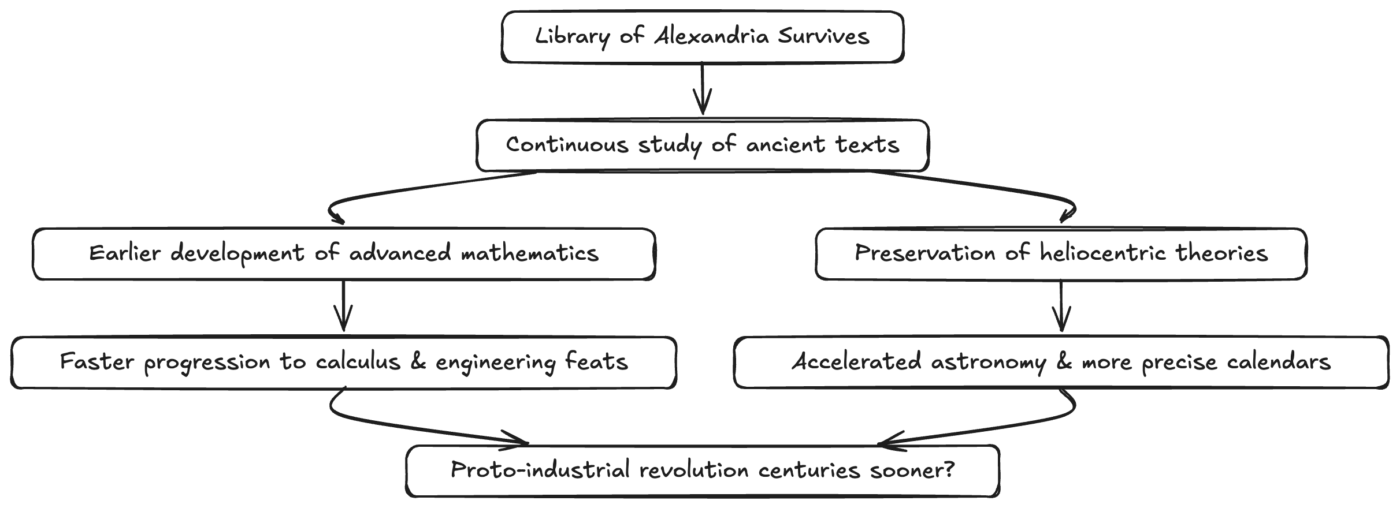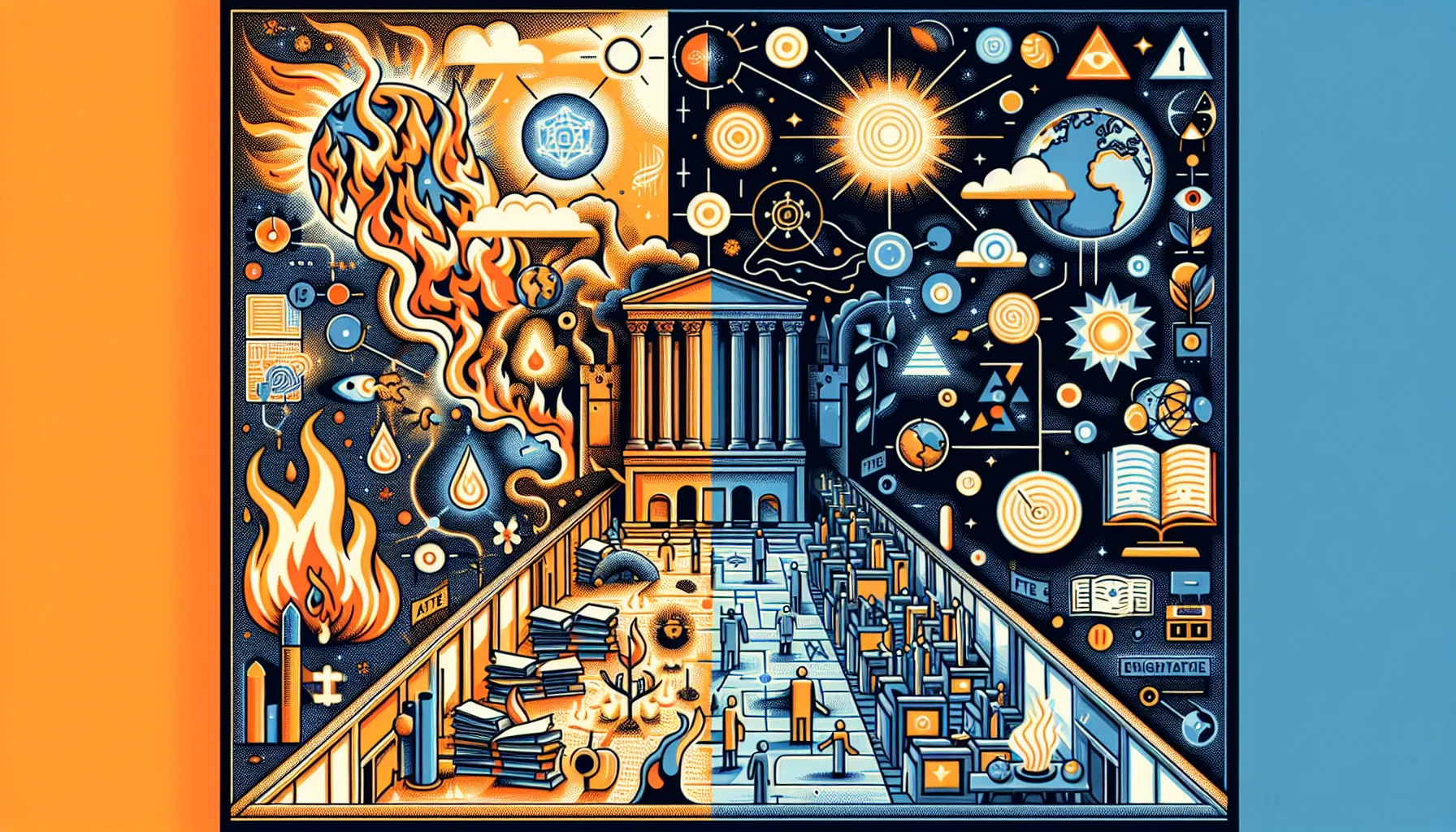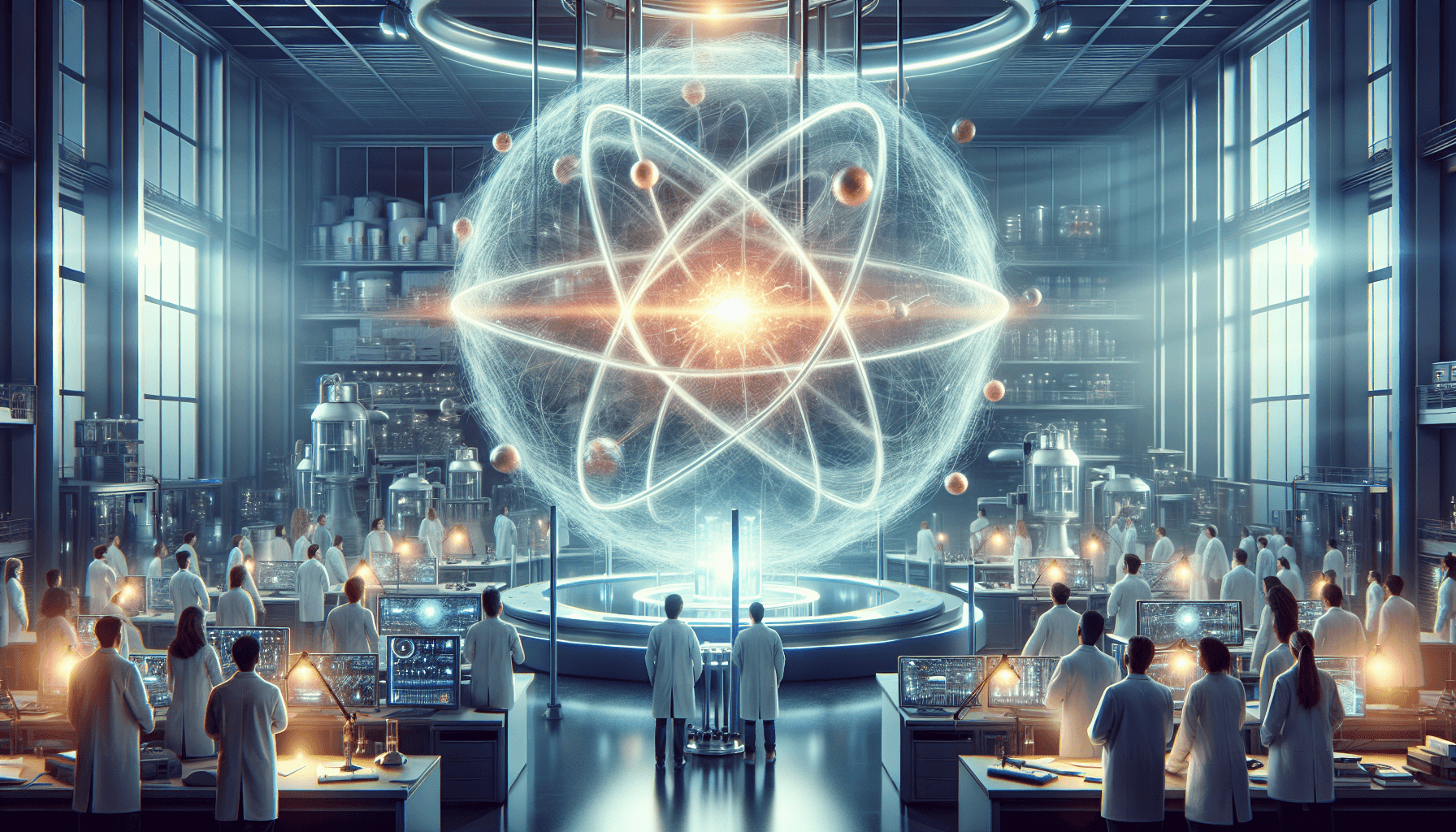TL;DR:History might have taken radically different turns if pivotal moments in science—from the burning of the Library of Alexandria to Einstein’s big ideas—had swung another way, reshaping our technology, beliefs, and entire societies along the way.
How One Twist of Fate Can Change the Course of Civilization
Science often progresses through a mix of brilliant insight, cultural support, and sheer luck. What if certain breakthroughs never happened? What if crucial discoveries were lost or overlooked? Imagine a world where ancient knowledge survived intact, or where Charles Darwin kept his ideas to himself. These pivotal crossroads—some small, others monumental—hint at how razor-thin the line can be between our familiar world and one that’s dramatically different.
Life would likely go on in any scenario, but scientific progress and society’s trajectory might be unrecognizable. Let’s explore seven critical “what if” moments in science that could have changed history forever.
The Library of Alexandria: A Lost Nexus of Knowledge
For centuries, the Library of Alexandria in Egypt was the seat of learning for the Western world. It housed texts from mathematics, astronomy, philosophy, and more, gathered from Greece, Egypt, Persia, India, and beyond. Legends vary on exactly how it was destroyed—some blame Julius Caesar’s army, others blame riots or even later conquests—but the fact remains that a colossal amount of knowledge was lost.
What if the Library Had Survived?
If the Library of Alexandria had remained intact, scholars may have had uninterrupted access to ancient texts. We could have seen an earlier flowering of science, mathematics, and technology—centuries before the Renaissance reignited learning in Europe. The painstaking rediscoveries of Greek geometry, Indian numerals, and Persian astronomy might have been shortcuts if those works had been continuously studied and built upon.
Imagine if the heliocentric model of the solar system—proposed much earlier than Copernicus—hadn’t faded into obscurity. We might have launched the Scientific Revolution centuries before it happened. The fusion of different cultures’ mathematics, technology, and philosophical frameworks could have shaped a more unified approach to inquiry, possibly bridging East and West knowledge bases earlier.
Possible Timeline Shifts
- Early Calculus: Greek mathematicians had rudimentary concepts of infinitesimals. With continuous scholarship, we might have witnessed a form of calculus emerging in antiquity, rather than waiting for Newton and Leibniz in the 17th century.
- Advanced Astronomy: Eratosthenes measured Earth’s circumference with remarkable accuracy. A preserved library might have supported robust experiments in planetary motion long before Galileo.
- Proto-Industrial Revolution: Access to advanced principles in engineering and steam mechanics could have spurred early forms of industrial technology, changing the course of empire-building and colonization.
Diagram: The Library’s Survival Leading to Multiple Scientific Outcomes

Diagram: Possible branching outcomes if the Library of Alexandria had remained a living hub of research.
The Reluctant Darwin: What if the Theory of Evolution Went Unpublished?
In the mid-19th century, Charles Darwin grappled with his theory of natural selection for over 20 years before finally publishing On the Origin of Species. Some speculate Darwin delayed because he feared backlash from religious circles and the broader public. Meanwhile, Alfred Russel Wallace was independently formulating similar ideas. Darwin’s hand was forced when Wallace sent him a paper echoing many of the same concepts.
Suppose Darwin Never Published?
If Darwin had chosen to keep his data locked away, Wallace might have been credited alone, or the concept might have emerged in a fractured, less cohesive manner. This could have slowed the widespread acceptance of evolutionary theory, pushing back research in genetics, medicine, and ecology. The moral and philosophical debates triggered by Darwin’s work—about humanity’s place in nature—might have unfolded differently or at a slower pace.
Without a unifying theory of evolution, biology might have remained more disconnected. Fields like phylogenetics (understanding relationships among species) might have lacked a guiding principle. The synergy between evolution and genetics that gave us insights into DNA structure could have been delayed or complicated. Understanding disease pathways, antibiotic resistance, and even cutting-edge gene-editing tools like CRISPR might all have come much later—or through a much more convoluted route.
Broader Cultural Ripples
Evolution didn’t just shake up biology; it influenced philosophy, religion, and societal norms. If Darwin’s book never created a global stir, different intellectual movements might have dominated. We might see an even stronger foothold of creationist perspectives in the 20th century, or a slower acceptance of secular scientific theories in schools and universities.
Newton’s Apple: What if Isaac Newton Never Formulated Gravity?
There’s a famous story—part legend, part historical record—that Isaac Newton was inspired to think about gravity when he observed an apple fall from a tree. While the exact details might be romanticized, Newton’s laws of motion and universal gravitation revolutionized science, bridging terrestrial and celestial physics under one framework.
An Alternative Universe Without Newton
Suppose Newton never pieced together the math describing how an apple’s drop mirrors the Moon’s orbit around Earth. We might still eventually get gravitational laws from other luminaries, but the clarity and unifying nature of Newton’s Principia might have taken longer to emerge. Kepler had planetary motion laws but lacked a universal gravitational principle. Leibniz had the calculus, but not the same gravitational insights. Without Newton’s synthesis, the 18th century’s massive strides in physics might have been scattered or stalled.
Delayed Industrial Revolution?
Newton’s mechanics underpinned engineering leaps. For instance, steam engines and precise ballistic trajectories rely on the math of forces, energy, and motion. A century’s delay in refining these principles could have slowed the Industrial Revolution that transformed Europe and later the world.
Astronomy, too, might have progressed more slowly. With no single, elegant framework linking falling objects on Earth to orbital motion, expeditions to measure planetary orbits or the transit of Venus might have lacked a unifying theory to test and refine. Ultimately, the ripple effect touches everything from navigation (key to global trade) to the forging of modern scientific methods.
Electricity’s Uncertain Dawn: What if Michael Faraday Stayed a Blacksmith?
In early 19th-century Britain, Michael Faraday was the son of a blacksmith and received minimal formal education. Yet he went on to pioneer electromagnetism, discovering how changing magnetic fields create electrical currents. He was also instrumental in creating early electric motors. Had Faraday not pursued science—or had he been trapped in poverty or stuck in an apprenticeship that never allowed him to tinker with experiments—our understanding of electricity might have lagged.
Without Faraday’s Foundations
No Faraday means no direct link from magnetism to electricity spelled out in such a clear, experimental fashion. The next steps by Maxwell, who formulated the equations uniting electricity and magnetism into electromagnetism, might have been slower or less cohesive. This in turn affects the entire timeline of the electrical revolution, from telegraphs and light bulbs to modern electronics and the internet.
Electromagnetic induction—the phenomenon Faraday discovered—enables every generator at power plants today. Without that, the entire grid we rely upon could have been delayed or taken a different path, possibly focusing more on mechanical or steam-based solutions.
Domino Effects on Communication and Industry
Telephones, radio, television, and eventually computers all trace roots to Faraday’s fundamental experiments. If Earth were the size of a basketball, Faraday’s discoveries might be the “air” that lets the ball stay inflated—an invisible, yet essential background enabler. Remove that knowledge from the 19th-century timeline, and we’d be living in a very different 21st century, possibly still relying on more rudimentary mechanical means to harness energy.
The Missed RNA World: What if Rosalind Franklin’s Data Was Lost?
The discovery of the DNA double helix by Watson and Crick hinged on data from Rosalind Franklin’s X-ray crystallography images—especially the famous Photo 51. Franklin’s meticulous research was shared (some argue, without her full knowledge) and provided key insights to crack the structure.
A World Without the Double Helix
If Franklin’s data had been lost—or if she’d never pursued the project—Watson and Crick’s leap might have been delayed by years or decades. Molecular biology could have developed more slowly, changing the timeline for gene therapy, the Human Genome Project, and countless medical breakthroughs.
The entire biotech industry, built on manipulation of DNA, from GMOs to CRISPR gene editing, might have emerged in a more fragmented or delayed fashion. Vaccines for diseases might still be discovered, but at a slower pace. Crop modifications to handle climate stress might have arrived too late for some regions.
Alternative Genetics Theories
Before the double helix, competing theories about heredity vied for acceptance. Some scientists hypothesized proteins carried genetic information. A major delay in revealing DNA’s structure could have prolonged these alternative views, limiting investments in DNA-based research and slowing the synergy between academia and industry that propelled biotechnology forward.
The Nuclear Path Not Taken: What if Nuclear Energy Had Stayed Peaceful?
After splitting the atom in the 1930s, scientists realized atomic fission could yield massive energy. World War II quickly funneled research into developing nuclear weapons, culminating in the bombs dropped on Hiroshima and Nagasaki. The rest is history: an arms race, Cold War tension, and the overshadowing of peaceful nuclear power by destructive potential.
In an Alternate Scenario
If nuclear research had stayed purely peaceful—imagine no direct funding from wartime governments—then we might have harnessed fission in a calmer, more systematic way. The stigma around nuclear power might never have formed. Nations might have come together to build safe nuclear reactors for generating electricity and powering ships. Fission’s terrifying association with bombs might be replaced by an image of a steady, low-carbon energy source.
Diagram: Nuclear Research Branching Paths

Diagram: Two potential paths for nuclear research—one focusing on peace, the other entangled in weapons development.
In that scenario, nuclear power’s reputation might be akin to wind or solar—just another tool in the energy mix. We might see lower fossil fuel use, earlier progress in fusion experiments, or a different set of geopolitical alliances, shaped not by nuclear warheads but by cooperative energy pacts.
Einstein’s Silence: What if Relativity Remained Unpublished?
Albert Einstein’s General Relativity and Special Relativity profoundly reshaped physics. They’re not just academic curiosities—GPS satellites, for instance, need relativistic corrections to maintain accurate navigation data. If Einstein never published his papers, or if the scientific community rejected them outright, our conception of space, time, and gravity would be incomplete.
Lost Cosmological Insights
Relativity set the stage for cosmology, leading to the Big Bang theory and an expanding universe. Without it, astronomers might still interpret cosmic redshifts incorrectly, delaying the realization that galaxies are receding. We might have stuck to older notions of a static universe much longer.
Technology Lags
Particle accelerators and advanced electronics rely on relativistic equations to plan experiments. It also underpins aspects of nuclear physics, connecting mass, energy, and the nature of atomic forces. If these insights arrived decades later, it might have stalled everything from advanced microchips to our current wave of quantum-based research.
Will Another “What If” Moment Happen in Our Lifetime?
Science continues to develop at breakneck pace. From artificial intelligence to gene editing, we are likely living through potential “what if” moments right now. Consider how AI might reshape the workforce or how CRISPR-based solutions could eradicate diseases. If certain key events or breakthroughs were blocked, restricted, or never funded, the future would unroll differently.
Myth-Busting Common Misconceptions
Myth: Science Progresses Inevitably
Reality: While it might seem that breakthroughs are bound to happen, many rely on the right person in the right place with the right resources. Timing and political contexts matter hugely. If you remove one critical figure or resource, progress can stall for decades.
Myth: Lost Knowledge is Gone Forever
Reality: In some cases, knowledge is rediscovered, but it might take centuries of rework. The lost texts from the Library of Alexandria partly reemerged through translations in the Islamic Golden Age. But that reintroduction delayed scientific progress, proving that losing knowledge can set civilizations back.
Myth: Revolutionary Ideas Always Triumph Instantly
Reality: Darwin, Newton, and Einstein all faced skepticism and internal doubts. Sometimes a new theory lingers in near-obscurity for years until it gains traction. There’s nothing “inevitable” about acceptance; it often depends on external events (funding, global wars, cultural shifts).
FAQ Section
What qualifies as a “what if” moment?
It’s a crucial fork in scientific development where an event or discovery could have gone differently—someone not publishing a key paper, a library burning, a scientist losing funding. These forks represent points where history might’ve diverged if circumstances changed.
Could scientific progress truly have been delayed for centuries by any single lost discovery?
In some instances, yes. The reintroduction of Greek texts in Europe after the Middle Ages significantly spurred the Renaissance. If that knowledge had never been lost, or if it had been lost forever, the timeline of discovery would look radically different.
Are we living through such a moment today?
Likely. Artificial intelligence, quantum computing, fusion energy, and biotechnologies each have the potential to rewrite human history. Decisions about funding, regulation, or global collaboration could shape whether breakthroughs happen quickly or remain stuck.
Do “what if” moments always result in beneficial changes if reversed?
Not necessarily. Some alternate scenarios might have led to earlier but riskier tech development, or to major ethical dilemmas. There’s no guarantee the alternative timeline would be better—just different.
Key Lessons from History’s Near-Misses
- Importance of Preservation: The destruction of the Library of Alexandria underscores the fragility of knowledge. Initiatives to digitize and back up data around the globe reflect a modern effort to prevent history from repeating itself.
- Role of Individual Agency: People like Michael Faraday or Rosalind Franklin were pivotal. Their personal journeys—shaped by chance, perseverance, or mentorship—remind us that individual destinies can alter global progress.
- Complex Interplay of War and Peace: Nuclear energy’s shift from “limitless power source” to “ultimate weapon” highlights how politics can steer scientific breakthroughs down drastically different paths.
- Sociocultural Context: Darwin waited out of concern for social repercussions. Einstein’s ideas were nearly overshadowed by contemporary skepticism. Both examples show that scientific acceptance relies not just on data but also on societal readiness.
Relatable Comparisons
If Earth were the size of a basketball, each new idea in science might be like a tiny pinprick of insight that can reshape the entire planet’s cultural landscape. Some pinpricks vanish quickly, others expand and color the world forever. If we lost certain pinpricks, the basketball might look entirely different—maybe with a different swirl of continents or a changed climate. These “what if” scenarios highlight how small events in the scientific realm can paint an entirely new picture of civilization.
The Unbroken Thread vs. Sudden Snaps
In a perfect world, knowledge forms a smooth continuum—old findings lead to new breakthroughs, which become tomorrow’s conventional wisdom. In reality, the chain can snap. Entire fields get lost, suppressed, or underfunded, only to be rediscovered by chance. This cyclical pattern means we can never assume inevitability in progress.
Science is both resilient (because eventually, truths can be rediscovered) and fragile (because each step relies on prior steps and circumstances). The “what if” moments show just how entwined our global progress is with historical accidents and personal choices.
Branching Visions of a Different World
In certain timelines, humanity might already have colonized space, or still be stuck with 19th-century technology. The difference can pivot on singular moments—like we’ve seen with Darwin or Faraday—or longer processes, such as the destruction of entire libraries.
So the next time you stumble on a new piece of research or see a lab on the brink of a big discovery, remember: We could be witnessing a new “what if” crossroad in the making. Embracing knowledge, fostering open research, and preserving our scientific heritage ensure we keep forging ahead rather than losing our path.
Read More
- The Library of Alexandria: Centre of Learning in the Ancient World (Amazon)
- Darwin’s Ghost: The Origin of Species Updated (Amazon)
- Faraday, Maxwell, and the Electromagnetic Field (Amazon)
- Einstein: His Life and Universe (Amazon)
These resources delve deeper into the pivotal moments, figures, and ideas that shaped science—and the near-misses that could have diverted our world onto a dramatically different path.



